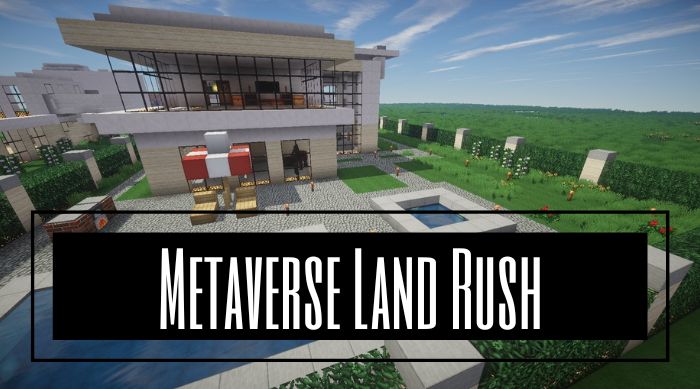In the early days of America, the California Gold Rush was a force to be reckoned with. From 1848 to 1855, some 300,000 thousand people came to California from elsewhere to try their luck and strike it rich. Gold fever was the subject of many films including the Humphrey Bogart classic, Treasure of the Sierra Madre.
In the second decade of the 21st Century, a digital land rush is bringing thousands into the metaverse to do the same thing, but with virtual real estate replacing gold nuggets. How serious is this land rush?

In the earliest weeks of 2022, PricewaterhouseCoopers (PwC) invested in virtual real estate by making a purchase from Sandbox. Another major name, HSBC, also made digital real estate purchases and started an investment fund to do more buying.
This article discusses using cryptocurrency to buy virtual real estate. It does not address using crypto to purchase IRL real estate. That’s a topic for a different article.
The Metaverse Land Rush
Digital real estate in a metaverse setting isn’t a new idea. Remember Second Life? This virtual world debuted in 2003, and many sources claim the project has long since passed the height of interest from players.
Second Life allows you to buy and sell real estate in the metaverse, and according to at least one source some one million users still have Second Life accounts.
The latest wave of metaverse real estate options include The Sandbox and Decentraland, and the prices can get fairly aspirational. The price of a single plot of “land” in a metaverse can cost as much as $12,000, and if certain conditions persist the entire digital real estate market could be worth some $5 billion by 2026. At least according to some pundits.
But how much of the digital real estate craze is hype and how much of it is over-inflated by a large amount of interest at the moment?
Buying Real Estate In The Metaverse: Your Experience May Vary
There are two factors to consider when thinking about virtual real estate. One is that buying such properties is a risky venture. Buying virtual land on the blockchain is incredibly speculative and if you are risk-averse this pursuit is not for you.
If the coin you are dealing with suffers a setback in value, your holdings could be similarly affected.
If a project decides to close up shop and terminate operations, the disposition of your virtual real estate may depend on the fine print of the project’s terms of service. You will want to know what your specific rights and responsibilities are for such contingencies.
Remember, crypto is a largely unregulated world and as such your risks for loss are high. Know your terms and conditions for best results.
The other factor to think about when buying virtual real estate or digital land? Who is running or associated with the project.
Reputation counts in crypto, and the more highly visible you are the better you might fare with a new project. And the people who are interested in your project may do as much to promote the work as the people actually creating the worlds.
Famous Names As Your Virtual Neighbor?
Snoop Dogg bought a parcel of land in The Sandbox, with another purchase right next door to the rapper’s plot going for nearly half a million dollars. Did one purchase inform the other, price-wise? Likely. And more Snoop Dogg fans who are into crypto are likely to follow suit
The fact that a known celebrity is interested in The Sandbox likely doesn’t hurt that project’s chances at continued cash flow, good press, and stable operations.
But what about a lesser-known project? It may be cheaper and easier to buy into a virtual world that isn’t in the middle of a buying frenzy due to a celeb endorsement or some other factor. But the risks are elevated, too. Does a virtual world that has little interest manage to survive long enough to operate more like one of the more dependable options in the space?
You might think that’s fairly obvious. But just because you have name recognition and a big following does not guarantee a virtual world or metaverse’s success.
Facebook Tries To Join The Fray
When Facebook, later Meta, announced it was getting into the metaverse business, it was met near-instantly with derision. Meta also experienced a whopping 26% drop in its stock price–that due in part to FB users going to competing platforms like TikTok. That drop in value happened even in the face of “Zuck Bucks”, a plan that proposed Facebook or Meta coins and lending services.
At least one source reports Meta was looking at in-app tokens and not blockchain-based currency. That said, Mark Zuckerberg has made noises about NFTs, compensating those who make them, and offering ways to monetize those NFTs, with Facebook / Meta likely taking a fee for those transactions off the top.
Facebook may try to enter the metaverse frenzy, but critics of the service say the basic structure of Facebook / Meta is antithetical to the nature of crypto.
The lesson here? Social media giants don’t get a guarantee of success in the metaverse space in spite of their ubiquity. Facebook / Meta gave crypto a good try; one Meta project sought to develop a virtual coin, but the company wound up letting go of the project in the end.
Part of the reason? The company couldn’t get U.S. regulators’ approval. Stability issues and antitrust concerns helped derail the project, at least from the regulatory angle.
Metaverse Land Rush: Running The Numbers
Is there a real land rush happening in metaverses like The Sandbox? Starting from a very high angle, we learn that about half of the more than two million crypto wallets listed on The Sandbox are owned by users who registered wallets for the first time. They did so when they signed up for a Sandbox Account.
Of the number of total users, some 20,000 Sandbox members have purchased land there. Some 70% of the available real estate in The Sandbox has an owner. Bored Ape Yacht Club had a plan to sell NFT real estate as part of its Otherside virtual world; some 50,000 plots of digital land selling for about $6,000 dollars worth of ApeCoin.
Digital Realtors?
And then there are the brokers. One website designed to look very similar to a real-world real estate agent site offers virtual property to buyers with an admonition to buy “land” from the Tilia.Earth Metaverse, stating “no prior knowledge of the crypto world is required, simply pay in your currency by credit card, and we will send your NFT property to your virtual wallet.”
This particular operation is fairly transparent about its motivations to offer virtual real estate. The language on the official site is fairly straightforward about virtual property flipping. “Once the property has been purchased, keep it until you choose to resell it at a price of your chosen price, on any platform.”
The elephant in the room for this particular business is whether or not buyers want to invest in a property in that particular metaverse. The ability to freely sell virtual land isn’t quite enough to tempt a serious investor, it’s useless to put a “for sale” sign up when nobody is around to look at what you’re offering.
Whether that describes conditions in the Tilia.Earth Metaverse or not remains to be seen, but it is an important consideration.
Things To Remember About Virtual Real Estate
Aside from the usual warnings about volatility and the speculative nature of crypto in general, there’s one thing you might not think about when buying your first plot of digital land. The way people cannot simply buy a plot of land in real life and expect the sale price of that land and nothing more? That may be true when you buy land in the metaverse.
In the real world, you have property taxes, building permits, and appliances to buy. When you buy land in the metaverse, are you buying within a social space that encourages you to interact with people like in real life?
Or are you buying land in a game? The difference is important because in-game purchases are often tied to OTHER in-game purchases. You may or may not be able to buy the land and enjoy owning it without buying more accessories and spending more money.
In other words, it’s important to ask whether you are getting onto a treadmill of purchases in the metaverse or not. Does one purchase rely on another? Do you benefit only when buying more items together or collecting them?
You may be required by the rules of the game to buy more and develop more. Knowing that in advance might affect your decision to buy the land in the first place. Some platforms want you to think about becoming a land reseller or even a landlord.
Others might just be happy to accept your purchase and let you do what you will with the property. It may be necessary to ask other users about their experience in purchasing from that crypto project to see if there’s a consensus on the metaverse, its prices, and features.
Joe Wallace has covered real estate and financial topics, including crypto and NFTs since 1995. His work has appeared on Veteran.com, The Pentagon Channel, ABC and many print and online publications. Joe is a 13-year veteran of the United States Air Force and a former reporter for Air Force Television News.


